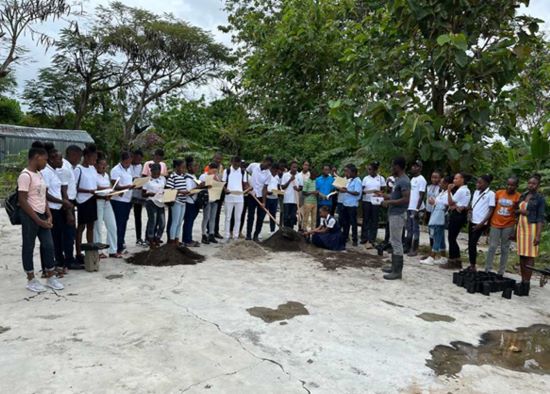May 21, 2024
Despite Unrest in Haiti KSU-CEMARCH Partnership Hosts May Day Activities

Through its’ USAID Feed the Future Sustainable Intensification Innovation Lab (SIIL), Kansas State University (KSU) has partnered with six agricultural universities in Haiti, with an overall goal to create improved agricultural sustainability in research and education. Called CEMARCH (Center for Mitigation, Adaptation, and Resilience to Climate-Change in Haiti), this 12 million-dollar USAID-Haiti supported KSU project works with Haitian faculty, students, farmers, members of private ag groups, and government ministers. With a tagline of ‘By Haitians for Haitians’ KSU works with their Haitian partner universities to create BS and MS scholarships, conduct research at university Agricultural Technology Parks, and develop training opportunities for farmers and other local citizens in Haiti. Given the current safety and security issues in Haiti, and especially those in the capital of Port-au-Prince, there are times when the university work is at jeopardy. However, when Haitian Labor Day and Haitian Agricultural Day occur in the same May 1 window it is time for an education celebration!
Four CEMARCH partners hosted Labor and Agriculture Day events that spanned from April 28th to May 1st. First was The American University of the Caribbean (AUC) who hosted both an agricultural fair and educational conference. With the theme "Agriculture, Agro-industry, and Urban Planning in the Deep South with Regard to Climate Change," they raised awareness about the challenges related to agriculture in Southern Haiti in the face of climate change. There were 500 registered attendees for the climate conference, and vendors sold their agricultural products - some (vegetables, honey) of which came from work at the ag tech park.
Continuing in the general KSU-CEMARCH goal were the activities of Universite Notre Dame de Haiti (UNDH). On May 1st, UNDH welcomed over 45 students from area high schools. Using interactive sessions and hands-on reforestation activities (supervised by CEMARCH scholarship BS agriculture students), participants gained valuable insights into the importance of environmental protection and sustainable practices, especially for reforestation.
As noted by university distinguished professor, and R.O. Kruse professor, and KSU SIIL Director Dr. Vara Prasad ‘the education and demonstration projects offered at these various fairs directly fits the goals of CEMARCH – which is to work with Haitians for soil and water protection in a changing climate’.
Their fair, organized in collaboration with the Ministry of Agriculture, through the Ag Departmental Direction of the North East, promoted agricultural development and innovation and enabled them to host an open house for their renovated irrigation and greenhouse systems, all repaired with KSU support.
Dr. Absalon Pierre, the Chief of Party of CEMARCH said, "It is remarkable how CEMARCH has been able to get functioning in such a short time. Thanks to the support of USAID and KSU, this project will start to provide valuable production information for growers in the area."
Despite security issues in the surrounding the University of Quisqueya, near Port-au-Prince the May 1st fair at Quisqueya saw an impressive turnout, with a diverse mix of participants contributing to its success. Among the 200 attendees were representatives from various sectors, including 25 local organizations and local businesses. A significant number of farmers and community members actively engaged in the workshops and activities, demonstrating their keen interest in adopting innovative agricultural practices, especially novel newly created foods, and small equipment mechanization.
In all, the activities of May 1, 2024 are a testimony to the strong partnerships developed between USAID, KSU and our partner universities in Haiti. Proper funding, team-based leadership and continued communication enabled these events to happen, even in regions of some risk. It truly shows that Haiti can flourish in troubling times, working to create opportunities in Haitian agriculture for their farmers and citizens.